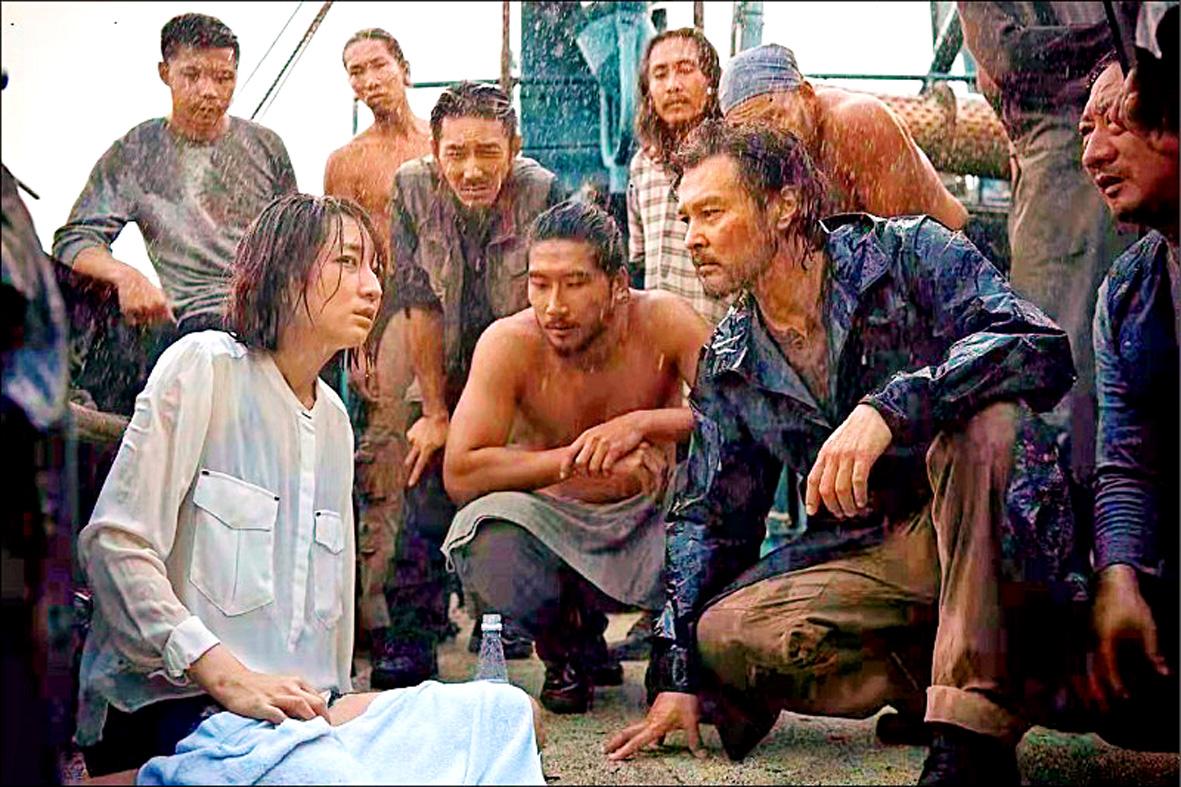I had really hoped that this film would be a Taiwanese answer to the American camp classic Snakes on a Plane, but Spiders on a Ship — er, Abyssal Spider (海霧) — takes itself way too seriously. One major gripe about Taiwanese commercial features is that they are prone to being unnecessarily over the top, but that’s the one element that could have made Abyssal more watchable.
The lack of camp is especially disappointing since director Joe Chien (錢人豪) first made his mark with the intentionally trashy horror movie Zombie 108 (棄城Z-108). Released in 2012, it is considered Taiwan’s earliest zombie flick. Chien has since moved away from that style, helming in 2018 The House That Never Dies: Reawakening (京城81號2), the follow-up to China’s most successful mainstream horror production.
Featuring violent scheming factions on a creepy fishing ship that is stuck in radioactive waters infested with giant crab-spiders (and a beautiful woman who appears out of nowhere), Abyssal Spider has the right elements for a so-bad-it’s-good B-movie bonanza. But Chien crams too many themes and storylines into a claustrophobic vessel, when perhaps all that’s needed is more blood and zaniness.

Photo courtesy of Deepjoy Picture Entertainment
Objectively speaking, the film is a decent effort at a monster-disaster thriller, slickly produced with a star-studded cast that seems to be chosen just for their names, as there is little chemistry and uneven acting. Those raised on a steady diet of Hollywood productions of the same ilk will find it quite derivative. There are glimpses of promise for sure, especially with the special effects, cinematography and set design. But there isn’t a solid plot to match the technical competence.
The main storyline revolves around A-jie (Sunny Wang 王陽明), who has become depressed after his impulsiveness led to the death of his marine rescue squad captain, while his wife dies in labor that same night. After aimlessly roaming around for a few years, he puts his life back together for the sake of his daughter. Inexplicably, his first move is to convince his father-in-law (Andrew Lin, 連凱) to allow him to join his fishing vessel’s next long-haul journey, even though the entire crew hates A-Jie and isn’t shy to show it, constantly threatening him with violence even before the ship sets sail.
What A-jie actually contributes to the ship is not clear; he’s seen mostly sulking and is constantly being provoked into physical conflicts with his crewmates, which becomes tiring for the viewer. He’s the one who insisted on boarding the ship fully aware of its hostile environment, which makes his plight less sympathetic.
The crew, which is divided into two factions, resembles hoodlums more than fishers — the vile, sleazy kind who would rob old ladies, not the dignified type in the gangster-hero genre.
One side just wants to catch fish and make an honest living, while the other is planning something more nefarious.
Amidst all the infighting, unbearably juvenile bullying and incessant bickering, a massive storm hits, then mutant spiders attack! They soon find a random woman drifting in the ocean (Alice Ko, 柯佳嬿), who seems to serve no purpose other than to add a female presence to a ship that’s about to explode with testosterone. The story is just pieces piled on top of each other like this with almost no character development or believable tension, leaving a very flat cadence that drags on until the 107 minutes are over.
Although there appears to be a lot going on, there’s no real cohesive plot or meaningful dialogue to drive the movie forward and keep the viewers engaged, leading to long stretches of sheer boredom despite the on screen chaos. Also distracting are the plot holes that are large enough to sink a ship. It is true that if each character actually used their brains, no horror plot would ever go anywhere, but in Abyssal Spider, it seems that every cast member, including the well-meaning captain, is purposely steering the boat towards utter disaster for no good reason.

Late last month Philippines Foreign Affairs Secretary Theresa Lazaro told the Philippine Senate that the nation has sufficient funds to evacuate the nearly 170,000 Filipino residents in Taiwan, 84 percent of whom are migrant workers, in the event of war. Agencies have been exploring evacuation scenarios since early this year, she said. She also observed that since the Philippines has only limited ships, the government is consulting security agencies for alternatives. Filipinos are a distant third in overall migrant worker population. Indonesia has over 248,000 workers, followed by roughly 240,000 Vietnamese. It should be noted that there are another 170,000

Enter the Dragon 13 will bring Taiwan’s first taste of Dirty Boxing Sunday at Taipei Gymnasium, one highlight of a mixed-rules card blending new formats with traditional MMA. The undercard starts at 10:30am, with the main card beginning at 4pm. Tickets are NT$1,200. Dirty Boxing is a US-born ruleset popularized by fighters Mike Perry and Jon Jones as an alternative to boxing. The format has gained traction overseas, with its inaugural championship streamed free to millions on YouTube, Facebook and Instagram. Taiwan’s version allows punches and elbows with clinch striking, but bans kicks, knees and takedowns. The rules are stricter than the

“Far from being a rock or island … it turns out that the best metaphor to describe the human body is ‘sponge.’ We’re permeable,” write Rick Smith and Bruce Lourie in their book Slow Death By Rubber Duck: The Secret Danger of Everyday Things. While the permeability of our cells is key to being alive, it also means we absorb more potentially harmful substances than we realize. Studies have found a number of chemical residues in human breast milk, urine and water systems. Many of them are endocrine disruptors, which can interfere with the body’s natural hormones. “They can mimic, block

Pratas Island, or Dongsha (東沙群島) had lain off the southern coast of China for thousands of years with no one claiming it until 1908, when a Japanese merchant set up a facility there to harvest guano. The Americans, then overlords of the Philippines, disturbed to learn of Japanese expansion so close to their colony, alerted the Manchu (Qing) government. That same year the British government asked the Manchus who owned the island, which prompted the Manchu government to make a claim, according to South China Sea expert Bill Hayton. In 1909 the government of Guangdong finally got around to sending